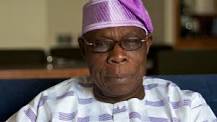
Nigeria’s former president, Olusegun Obasanjo, has lamented the failure of certain “privileged young men and women” he helped to top positions in government and the private sector.
The former president stated this in a letter he wrote to senior lawyer, Olisa Agbakoba.
Mr. Agbakoba, former President of the Nigerian Bar Association, had earlier written Mr. Obasanjo, requesting the former president’s support for generational shift in political leadership in Nigeria.
Mr. Agbakoba cited examples of former military leader, Yakubu Gowon, and Mr. Obasanjo himself who were entrusted with positions of public responsibility in their thirties.
In his reply via a letter dated July 28, but just released to the public on Thursday, Mr. Obasanjo, shared Mr. Agbakoba’s sentiments, but, nevertheless, expressed concerns and warned young people could not get to leadership positions on a platter of gold.
He noted that he, Mr. Gowon and other young people who had earlier been in political leadership “were thrown up and brought into limelight by circumstances which were not our own making.”
At 31, Mr. Gowon became Nigeria’s leader following a bloody coup in July 1966. He pivoted the affairs of the country, while slithering through a 30-month civil war to stop the secessionist movement in the country’s east.
Mr. Obasanjo was 38 when he became the military Head of State in February 1976 as a successor to Murtala Mohammed, who was slain in the failed February 13, 1976 coup led by Bukar Dimka. At the time of assassination, late Mr. Mohammed was 37.
Those earlier young leaders, Mr. Obasanjo said, recorded “varying degree of successes” with “determination, commitment, broad national outlook, integrity and uncommon zeal to shoulder the responsibilities trust on us.”
He regretted that the successes recorded by his “so-called old generation” had been pushed down the drain by some of those privileged young people saddled with similar responsibilities in the recent past.”
“You should know that some of these young people, whose interest we canvass, have, in the recent past, been a complete disappointment and failures in their various appointed or elected positions,” he said.
“Some of these young people, in public and private sectors, have frittered the prospect of being at the vanguard of sustainable development of what some of us, the earlier generation of leaders, pioneered on the altar of their crass materialism, self-centredness and opportunism.”
In Mr. Obasanjo’s second coming to lead Nigeria, 1999-2007, as a democratically elected president, he appointed various relatively young persons into his government, including the now Kaduna State Governor, Nasir El-Rufai, who was 39 at the time he became head of the Bureau of Public Enterprises in 1999.
He also helped facilitate multi-billion business opportunities for Femi Otedola and Jimoh Ibrahim, now two of Nigeria’s richest people.
Facing Mr. Agbakoba, 64, Mr. Obasanjo challenged the lawyer on leadership. He said foremost leaders like Obafemi Awolowo and Nnamdi Azikiwe were much younger when they emerged on the national stage and helped Nigeria gain independence.
“Jump down from the fence and siddon look corner,” said Mr. Obasanjo to Mr. Agbakoba.
“I ask you, dear Olisa, you are at a point where you should step forward and develop a mobilisation framework that seeks to rearrange Nigeria on a different basis of legitimacy.”
Mr. Obasanjo has been instrumental to the victories of his three successors – late Umaru Yar’Adua; Goodluck Jonathan; and Muhammadu Buhari, the incumbent. None of them was less than 50 at the time of emergence.
END

![Olisa Agbakoba Olisa Agbakoba [Photo Credit: ThisDay Newspapers]](https://i1.wp.com/media.premiumtimesng.com/wp-content/files/2017/08/Olisa-Agbakoba.jpg?resize=600%2C338)
Be the first to comment